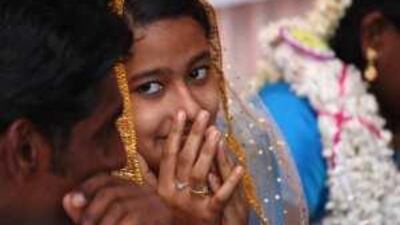I would like to thank your correspondent Suryatapa Bhattacharya for covering the big wedding ceremony in a village in Kerala (Philanthropic expats pay for nine big weddings, January 19). A wedding ceremony may not seem to be so special for the busy world, those who pay no attention to the poor. But you have marked it as a national or international issue. Weddings in Kerala have become very expensive and a luxury, as the girls' parents have to pay a huge amount and give gold to their daughter to get married. It has become a compulsory custom among all communities. I believe in the commitment The National showed; let it be a model for all. It really highlighted the idea of a philanthropic outlook in newspapers, which we readers expect from you. KTO Abdurahiman, Abu Dhabi
First of all, let me take this opportunity to express my thanks in reporting the wedding ceremony conducted at Changaramkulam. It's a small village, but The Nationall made it a big one. The wedding we conducted was just extending a hand to the poor and unwed girls to get them married and pave a way to a new life.
Marriage was a stumbling block before for them due to their economic condition. The girls' relatives have to pay a big amount or gold to the bridegroom. Failing to do this would be a breach of words and consequently ends in the break of the alliance. Our organisation, Changatham Changaramkulam (Friends of Changaramkulam), decided to help needy unmarried girls get married. Five Hindu marriages and four Muslim marriages in a wedding hall! It's a model for the people on the cause of caste, community and religion. We are very happy that we have fulfilled our aim to bring the people together for a common cause. Thanks to The National and my special gratitude to Ms Bhattacharya. Jamal Mookkuthal, executive member, Friends of Changaramkulam, Abu Dhabi
Concerning Are too-slow women drivers to blame for accidents?, January 18: no doubt driving too slow can cause problems. Let us remember however that, except on the expressway, there are very few "minimum" speed limits. We must drive as conditions allow.
However, if we are talking about driving too slow on the expressway, then we need to examine the specific data. There is nothing illegal about driving at 120 kph in the left lane on the motorway if that is the speed limit. Just because someone doesn't get out of your way as you are flashing your lights and driving at 180 kph doesn't make them wrong. If you are driving faster, then it is your obligation to slow down. If you cause an accident while doing this, there is no one to blame but the speeding driver. Donald Glass, Abu Dhabi
Wind, sun and wave energy should be used where possible to develop agriculture, but oil, gas and diesel are also precious fuels (Gulf leaders defend virtues of fossil fuels, January 19). We have to save energy with water, too, for future developments in transport and other sectors. Muhammad Basit Qureshi, Oslo
Regarding Young and the restless, M Magazine, January 17: pretty interesting article, although how can you list Neil Young's best albums without mentioning On the Beach from 1974 or Zuma from 1975? Rick Pauley, Oklahoma City
I'm a small time investor compared with Mr Hardt, but I would certainly join my case with his against Damac if he'd allow me to (VIP investor' sues Damac, January 18). It's just unfair to take people's hard earned money since February 2008 and not deliver on projects as they are supposed to. Sam Jabr, Abu Dhabi
Concerning A soft spot for the East, January 17: this article seem to generalise about the physical effects of yoga. As an Ashtanga teacher, I see my students develop muscular and toned bodies. This is due to the weight-bearing postures and slow, strong and controlled movement that is a feature of this and other forms of dynamic forms of yoga. The tag of yoga being a "soft" option is not an accurate label and maybe one that has been developed by the softer forms of yoga promoted by organisations such as the British Wheel. Rob Leadley, York

